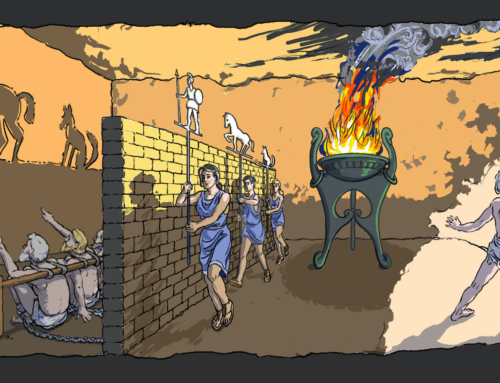What sort of thing is the internet? It’s not exactly a physical thing, but it was made by human hands. It is a real thing, but not something I can touch. It is something man-made but difficult to nail down because it is unlike just about everything else. Asking ‘what sort of a thing’ something is sends us to the door of metaphysics, the study of being, to find out what sort of a thing the internet might be.
Let me briefly (and painlessly) walk through the philosophy needed to consider this question. A definition of something requires a genus, or category, with a specific difference, or what sets something apart from the rest of the category. Definitions properly come from the study of logic but apply to metaphysics when we consider what something is. This will be all the philosophy we need.
A tech-savvy friend of mine once gave me a simple working definition for the internet: strictly speaking, it is a network connecting other networks. The internet does not necessarily have information on it; rather it’s what links different networks where information is stored. ‘Cloud’ storage is stored in data centers across the world and is accessible from anywhere in the world. It is incredibly convenient and efficient. But for non-technical people like me, I often miss this idea altogether. I usually think saving something to the cloud puts it somewhere in the ether. The point here is that the internet is a linking framework between devices and allows us to search for and obtain information. This information may be videos, text, or images. So what then is the internet? It is a network of networks. None of this is terribly illuminating but the implications are.
When we go on the internet, we will often say things like, “I am reading an article” or “I am watching my sister play with my newborn niece,” but we mean these things analogously. In reality, what we are doing is looking at a screen. An online article is a screen with an article on it. A video is a video of something, but we only see the video. If I were with my sister and niece, for example, I would in fact be watching them play in the first sense of the term. What is on a screen is always removed from reality. This isn’t necessarily a bad thing. If I thought this was entirely bad, I would be forsaking all the good the internet does. I would also be forced to think art is bad because looking at a painting of a sunset is not looking at a sunset. There is value in looking at screens, but the reality of our actions must be considered. The reality is that when interacting with the internet we are interacting with a device. The device brings information to us, and we interact with it.
Now consider social media. Social media interacts with the personal information of others. It is not, in fact, interacting with other human beings. The information people post or send on social media is just that, information. Never once has anyone looked at a picture of a friend or family member on social media and seen them. They looked at their phone and saw a picture of the person—information about him or her. Now of course this picture is light waves reflecting off the loved one, but it is still not the actual person. This is crucial to understand why social media can be such a vain endeavor. When we look at social media, we are looking through the internet to information under various formats posted in such a way that it represents a loved one. This means we are only indirectly encountering someone on the internet. In colloquial terms, we would say the internet is “not real.” When we use this expression, we are usually trying to indicate that something is an imitation, sign, or is analogous to something else. The same is true of Facetime, Snapchat, texting, etc. Because these things are so immediate we treat them as if they are real. But when I call my brother, if he ever picks up, I will still be talking to my laptop which will communicate with his phone which will interact with him. I am, in fact, not interacting with my brother but with my laptop.
So what is the internet? It is a network of networks. In other words, it is a kind of network that connects other networks. It is a cautionary observation that the internet is only a network connecting other networks and that it is not, in a sense, ‘real’. Little self-worth should be placed in a network. It is not interacting with the world, it is merely interacting with a device. Too much internet can cause us to become detached from reality, and the more detached we become from reality the easier it is for us to become entangled in lies and distracted from the truth. Truth is what Christ brought to us. Christ claims truth as his identity. There is a reason that monks live in rural places, that we go to beautiful places for vacation, and that people like to hug one another. These are all examples of interacting with reality, whereas the internet is not interacting with reality, or things in themselves. There is a unique way in which God is more present on a hot, muggy hike whereas he is not as present to us on the internet. I am not suggesting that the presence of God does not permeate the ideas expressed on the internet, but metaphysically speaking, the internet lacks a portion of what nature was given, namely truth and reality. The internet and social media are great for so much, but we must remember they are not real, in the full sense of the term. The internet and social media might as well be really cool card catalogs. We’re made for much more. So, while the internet can be helpful, just don’t live for it.
✠
Image: Generated with AI ∙October 3, 2024







